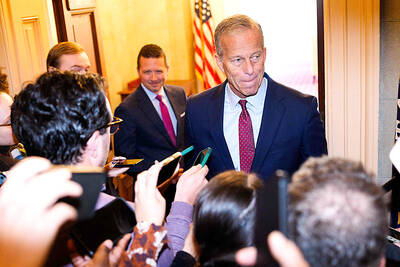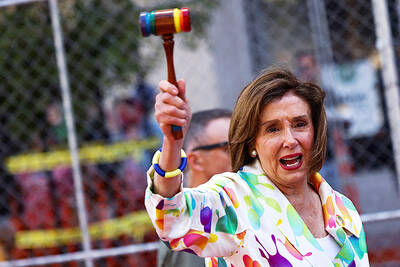Allegations of torture. Pictures of bloodied prisoners. Reminders of embarrassing acts by US troops.
All of a sudden, US President George W. Bush's administration finds itself thrown back on the defensive in its long campaign to persuade the Muslim world that the global war on terrorism is not a war on the Muslim faith.
In just a few days, the US has endured a pair of blows to its image abroad. The publication of previously unseen photos from the infamous Abu Ghraib prison in Iraq, plus a UN report calling for the closure of the US prison at Guantanamo Bay in Cuba, have forced the administration to defend its record and try to regain the public relations initiative.
"It reiterates how important the battle for hearts and minds is, and how poorly we're doing," said P.J. Crowley, a one-time Pentagon spokesman who is director of national defense and homeland security at the Center for American Progress, a liberal-leaning research institute.
With the Australian news media and the Web site Salon.com unveiling pictures and documents about US troops abusing Iraqis at Abu Ghraib in 2003, US Defense Secretary Donald Rumsfeld tried to put the matter to rest on Thursday. He told a congressional panel that nothing in the photos and videos was new, and had all been investigated.
"I'm told that these photographs that are coming out now are nothing more than the same things that came out before, if not identical, of the same type of behavior," Rumsfeld said. "That behavior's been punished."
Administration officials also sought to discredit a UN report released on Thursday on the US military's detention facility for terrorist suspects at Guantanamo Bay, which urged that it be closed down Some interrogation techniques caused extreme suffering, the UN report said.
"Such treatment amounts to torture," it said.
That's exactly the kind of accusation the Pentagon repeatedly has denied but cannot seem to escape, more than four years after terror suspects captured on the battlefield in Afghanistan began arriving at Guantanamo Bay.
Bryan Whitman, a spokesman for Rumsfeld, told reporters he saw no merit in the UN report, whose authors did not visit the prison after being promised only partial access to prisoners.
White House spokesman Scott McClellan rejected the report's call to shut down the prison compound.
"These are dangerous terrorists that we're talking about that are there," McClellan said, adding the report was a "rehash" of allegations based on claims by al-Qaeda terrorists who are trained to lie.
"It is difficult for us to preach democracy on the one hand when acting undemocratically -- if not illegally -- on the other hand," Crowley said.

James Watson — the Nobel laureate co-credited with the pivotal discovery of DNA’s double-helix structure, but whose career was later tainted by his repeated racist remarks — has died, his former lab said on Friday. He was 97. The eminent biologist died on Thursday in hospice care on Long Island in New York, announced the Cold Spring Harbor Laboratory, where he was based for much of his career. Watson became among the 20th century’s most storied scientists for his 1953 breakthrough discovery of the double helix with researcher partner Francis Crick. Along with Crick and Maurice Wilkins, he shared the

China’s Shenzhou-20 crewed spacecraft has delayed its return mission to Earth after the vessel was possibly hit by tiny bits of space debris, the country’s human spaceflight agency said yesterday, an unusual situation that could disrupt the operation of the country’s space station Tiangong. An impact analysis and risk assessment are underway, the China Manned Space Agency (CMSA) said in a statement, without providing a new schedule for the return mission, which was originally set to land in northern China yesterday. The delay highlights the danger to space travel posed by increasing amounts of debris, such as discarded launch vehicles or vessel

IMPASSE: US President Donald Trump pressed to end the filibuster in a sign that he is unlikely to compromise despite Democrat offers for a delayed healthcare vote The US government shutdown stretched into its 40th day yesterday even as senators stayed in Washington for a grueling weekend session hoping to find an end to the funding fight that has disrupted flights nationwide, threatened food assistance for millions of Americans and left federal workers without pay. The US Senate has so far shown few signs of progress over a weekend that could be crucial for the shutdown fight. Republican leaders are hoping to hold votes on a new package of bills that would reopen the government into January while also approving full-year funding for several parts of government, but

TOWERING FIGURE: To Republicans she was emblematic of the excesses of the liberal elite, but lawmakers admired her ability to corral her caucus through difficult votes Nancy Pelosi, a towering figure in US politics, a leading foe of US President Donald Trump and the first woman to serve as US House of Representatives speaker, on Thursday announced that she would step down at the next election. Admired as a master strategist with a no-nonsense leadership style that delivered for her party, the 85-year-old Democrat shepherded historic legislation through the US Congress as she navigated a bitter partisan divide. In later years, she was a fierce adversary of Trump, twice leading his impeachment and stunning Washington in 2020 when she ripped up a copy of his speech to the